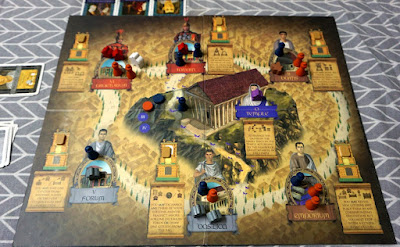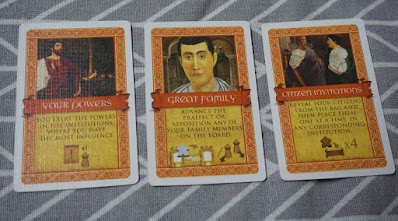The Game
Municipium is a 2008 game from Reiner Knizia. It was published by
Valley Games, which had a bit of reputation during its days. They managed to
secure rights to two long out-of-print classics, and the gamer community was
lucky to see these back in print. One of the games was Die Macher, and
the other Hannibal: Rome vs Carthage. Valley Games often used art and
design from Mike Doyle. I used to follow his blog. His style was
unconventional. Some of the games with his design work had some useability
concerns, but the art was bold and fresh.
The copy of Municipium I bought was a second hand copy. I saw
someone selling it on Facebook and decided to get it on a whim. This is an
out-of-print game and not easy to come by. I later realised that Allen my
regular gaming buddy who lives a 5-minute drive away from me actually has a
copy. I had completely forgotten that. Anyway, I'm happy to own this rare game
from Knizia.
The setting in Municipium is a colonial town of the great Roman Empire.
The town is developed and administered following the Roman governmental
template, which means you need to have a temple, a bath and other such
buildings that civilised people have. Players are powerful families in
town, vying for influence. You send your family members to mingle with folks
at the various buildings, hoping to gain influence over the citizenry. There
are four classes of citizens (in four different colours) and you need to charm all of them. Whenever you collect a set of citizens in four
different colours, you swap them for a coin. Whoever is first to collect his
fifth coin wins the game.

There are 7 buildings on the board. The temple is at the centre. The other six
surround it and are linked by a circular path. The temple is accessible via
two of the buildings. Your family members travel along the paths to the
various buildings. Every player has exactly 7 family members. What you do on
your turn is simple: take two steps and play a card. You may get one family
member to take two steps, or you may ask two family members to each take one
step. As for playing a card, you either draw one from the common draw deck to
play immediately, or you play one of your three personal cards. Personal cards
are single-use, so you better save them for when they are most effective.
Cards in the game have a number of different effects, e.g. letting you use the
power of a building where you have more family members than everyone else.

One card effect is advancing the praefect, i.e. the large white pawn above.
The praefect always moves one step clockwise along the circle of buildings.
Whenever he stops, he gives out a favour token to whoever has the most family
members at the building. Favour tokens are just like citizens, except they are
jokers and can be treated as any colour.
Every building is associated with one of the four citizen colours. Whenever
citizens of a particular colour are added, they must go to a building of that
colour. Once a building has three citizens, it is "harvest" time. Whoever has
the most family members gets to claim two of the citizens. The player with the
second most family members gets the third citizen. Generally this is how you
collect citizens.
You will always be competing to have the most family members at as many
buildings as possible. You need this to win citizens and also to trigger the
building powers. The temple at the centre is for tiebreaking. When the game
starts, the tiebreaker priority is set based on family members at the temple.
Once the game gets going, this priority is only updated when the temple power
is triggered. Ties do happen frequently, so it is often important to fight at
the temple. OK that sounds wrong and blasphemous.
These are the personal cards. Everyone gets the same three cards. They are
generally more powerful so use them wisely.
When your family member wears a crown he has the strength of two family
members. One of the buildings crown your family members. This is a form of
investment. If you invest early in strengthening your family members, it can
give you a significant advantage for the rest of the game.
Once you have a set of four citizens, you must trade them in for one coin. The
winning condition is 5 coins.
The Play
When I first read the rules the game felt a little complicated. Each building
has a different power. There are a few situations that can be triggered by
player actions and card effects, which need to be handled in specific ways.
There are quite a few different card powers too. However once I started
playing, I found the game pretty straight-forward. It's just move two steps
and play a card.
Municipium is at its core an area majority game. You compete to
have the most family members at the various buildings at the right time, i.e.
when the building powers are being triggered, and when there are enough
citizens to get distributed. Everyone only has seven family members. If you
want to be strong in some buildings, you will be weak in others. Priorities
priorities priorities.
The praefect moves in a somewhat predictable manner, so players naturally
gravitate towards competing at the next building he will visit. This is a
tactical aspect of the game. The game has both strategic and tactical
elements, and you can't ignore either. You need to worry about your overall
board position because it's important for your general success. Yet you must
not neglect the small tactical wins because they do add up.
The Thoughts
Municipium was never particularly popular. It is a medium weight game.
I think the lack of popularity is partly because it is in an awkward niche. It
is not simple and welcoming enough to appeal to people who like light and casual games,
and it is not the kind of heavy Eurogame that attracts the hardcore Eurogamers. The artwork probably detracted from its appeal. At first glance the
board looks rather dull. I find it a game with character. The building
powers are interesting and combine to create a coherent and unique experience. They are
not just random powers thrown together to create a problem for players to
solve. You can make clever combos from building powers. I always enjoy games that provide opportunities for smart play. This is a game with
high player interaction.
I consider myself lucky to land a copy of Municipium!
Off-topic
Now that my own game Dancing Queen is released, I sometimes
receive Paypal notifications about incoming payments. One recent
transaction puzzled me. The amount wasn't right. I checked my order sheet
and there was no such game order. Only when I checked the transaction
details on Paypal I realised this was not an order at all. It was a long-time reader supporting me and buying me coffee. I have been blogging for about 15 years now, and it has always been just sharing my personal journey. Nothing particularly ambitious. It is always rewarding to know that I have brought joy and useful information to others. Thank you to all who have been supporting me and to Bay-Wei Chang!






No comments:
Post a Comment